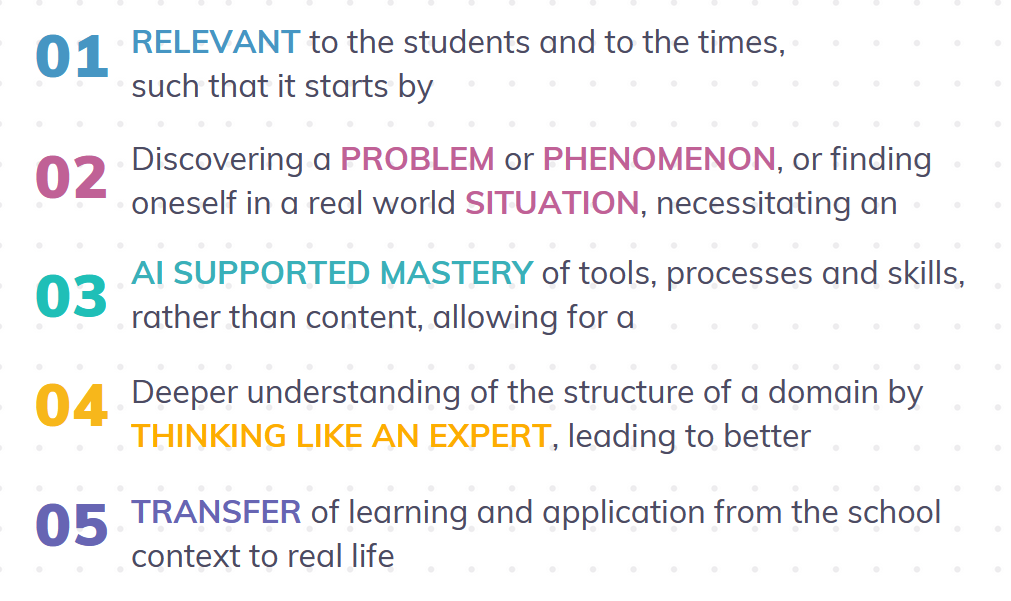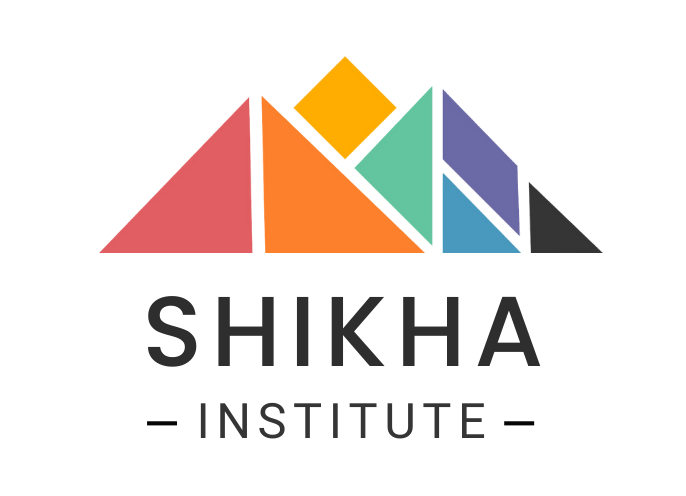CURRICULUM
What is worth learning?
The Institute is redesigning curriculum design by starting with the question: what is worth learning? What knowledge, attitudes and skills should a graduating student in the 21st century possess? Our curriculum is 100% project based, modular and aligned with all major boards and standards in the country.
TODAY, SCHOOL CURRICULUM SHOULD BE

We believe, a good curriculum should equip students with the ability to problem solve through building cognitive ability, critical thinking, creativity, communication, collaboration and a strong character.
Our 100% project based curriculum seeks to encourage students to deepen domain expertise by emphasizing process over content. Rather than teaching historical events, we teach students to analyze like a historian. Rather than teaching only grammar, we ask students to become great communicators.
The curriculum is modularized, student led and heavily scaffolded with technology tools.
We are currently developing units and lesson plans in the following five subjects.
Units in social studies are structured around asking “big questions” that delve into the history and structure of human societies. We particularly emphasize on Indian history and context.
Some sample big questions for units are:
- How have great civilizations fallen through history?
- How has the Indian constitution helped develop the idea of the nation?
- Why is India referred to as a sub-continent?
- What can we learn from historical leaders about leadership today?
- How will AI and new technologies shape the future of humanity?
These 20 hour project based units focus on literacy and communication skills, covering the spectrum of reading, speaking, listening and writing:
- Literature: delving into cultural and historical exploration, the human condition, imagination and the play of language in the hands of master authors. Students learn the art and science of writing, figuring out what makes a book “un-putdownable!”
- Library: uninhibited and chunked free time, with prompts and guidance to develop a deeper love for reading
- Interpersonal skills: Real-life, one-on-one communication scenarios both in professional and personal settings
- Public speaking: Building confidence, leadership and persuasion skills
- Creative writing: Replicating real writers workshops to allow imagination as well as learning the skill of creating engrossing works of fiction
- Academic writing: Building critical analysis, argumentation and formal writing skills
- Job-related role-plays: of communication focused jobs such as an advertiser, a lawyer, film-maker, politician and so on
The computer science curriculum consists of modularized, fully hands on, rigourous and meaningful project based units. The curriculum covers themes such as digital literacy and safety, programming and computational thinking, AI, robotics, product design and data sciences. The units are rigorous, real world and meaningful.
Projects in the art curriculum focus on elements, techniques, art history and philosophy and role-playing creative careers. Understanding and practicing the creative process as well as developing cultural and historical literacy are some of the goals of the curriculum.
Each project in this subject focuses on one of the twenty largest business sectors in India. Students take on roles of employees across corporate divisons, entrepreneurs, social enterprise founders and economists to solve real world problems across themes such as Marketing & Sales, Finance, Operations, Product Development, HR, Technology.
Some examples of big questions we cover across units are:
- How has India’s entrepreneurial ecosystem evolved?
- How can we promote financial literacy among the Indian population?
- How do organizations attract the right kind of employees?
- How can you turn your passion into a product or service?
- How will automation impact the future of work in India?
- How can family businesses evolve and adapt in a changing market?
- How can emerging technologies disrupt an entire sector?
- Can business innovation solve the world’s problems?
- Can a business be successful while also tackling social issues?
- What is the role of government in regulating businesses?
- How can organizations build a culture of well-being in the workplace?
